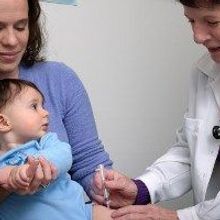Login
Subscribeadaptive immunity

SARS-CoV-2 Infection Can Alter Future Immune Reponses
Niki Spahich, PhD | Feb 22, 2023 | 3 min read
Males recovered from mild COVID-19 have baseline immune states primed to mount stronger responses to future challenges.

Can We Predict How Well Someone Will Respond to a Vaccine?
Natalia Mesa, PhD | Nov 14, 2022 | 7 min read
Researchers find signatures pre- and post-vaccination that correlate with a more robust immune response.

Exploring the SARS-CoV-2 Outer Cell Surface: Lessons in Innate and Adaptive Immunity
The Scientist | 1 min read
In this webinar, Alberto Lopez-Munoz will discuss SARS-CoV-2 nucleocapsid protein cell surface expression and its role in host immunity.

Researchers Probe Genetics Behind a Lizard’s Odd Immune System
Hannah Thomasy, PhD | May 10, 2022 | 4 min read
Deletions in the sleepy lizard genome leave it without an important type of T cells found in most other vertebrates.

David Gate Probes Links Between Alzheimer’s and the Immune System
James M. Gaines | Nov 1, 2021 | 4 min read
The Northwestern University researcher studies how adaptive immune cells influence neurodegenerative disease.

Retraining the Immune System Cavalry for Food Allergen Peacekeeping Missions
The Scientist | 1 min read
Explore food allergy immunotherapy for reversing patient symptoms.

COVID-19 Vaccine Combos Aim to Boost Immunity
Asher Jones | Mar 9, 2021 | 6 min read
Mix-and-match shots could simplify vaccine rollout and stimulate more-robust immune responses. Ongoing clinical trials will soon give answers.

Kids’ Severe COVID-19 Reaction Bears Unique Immune Signature
Shawna Williams | Sep 29, 2020 | 4 min read
The rare complication known as multisystem inflammatory syndrome in children (MIS-C) differs from both Kawasaki disease and severe adult cases of COVID-19, a study finds.

The Genetics Behind Immune Response Variability
The Scientist | 1 min read
Researchers seek genomic clues to understand differences in the immune response to infection.

The Search for Immune Responses that Stop COVID-19
Chris Baraniuk | Jul 24, 2020 | 5 min read
Scientists are examining the role of T cells, which are likely crucial for long-term protection against SARS-CoV-2.

Novel Type of Immune Cell Discovered in Type 1 Diabetes Patients
Katarina Zimmer | May 30, 2019 | 6 min read
A rogue hybrid lymphocyte, bearing characteristics of both B and T cells, may play a role in driving autoimmunity in the disease, although the mechanism is far from clear.

What's Mine is Yours: The Immunogenetics of Mating in Anglerfish
Sejal Davla, PhD | 1 min read
A suppressed immune system in anglerfish uncovers potential strategies for tissue transplantation.

Innate Immune Cells May Actually Remember Their Targets
Emma Yasinski | May 10, 2019 | 3 min read
Human natural killer cells, previously considered not to participate in adaptive immunity, remember viral antigens after initial exposures, according to a new study.

MYC Helps Cancer Hide
Anna Azvolinsky | Mar 10, 2016 | 3 min read
The transcriptional regulator dampens the immune system’s ability to elicit an antitumor response, a study shows.

LabTalk Podcast - A Modern Trojan Horse: Delivering Combination Immunotherapies to Solid Tumors
The Scientist and IsoPlexis | 1 min read
Katie McKenna discusses a combination CAR T and viral therapy that kills solid tumors.

Birth of the Skin Microbiome
Anna Azvolinsky | Nov 17, 2015 | 3 min read
The immune system tolerates the colonization of commensal bacteria on the skin with the aid of regulatory T cells during the first few weeks of life, a mouse study shows.

Neutrophils Lead, T Cells Follow
Anna Azvolinsky | Sep 3, 2015 | 3 min read
When influenza invades the mouse respiratory tract, neutrophils guide the subsequent T-cell attack on infected tissue, scientists show.

T Cells: A New Hope for Lasting Protection against SARS-CoV-2
The Scientist | 1 min read
Alessandro Sette and Shane Crotty discuss the T cell response to SARS-CoV-2 and the implications for vaccine design and robust immune memory.

Measles Vax’s Off-Target Effects
Jef Akst | May 11, 2015 | 1 min read
Researchers find evidence that measles vaccines reduced deaths from other infectious diseases due to “immune amnesia.”
